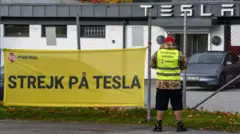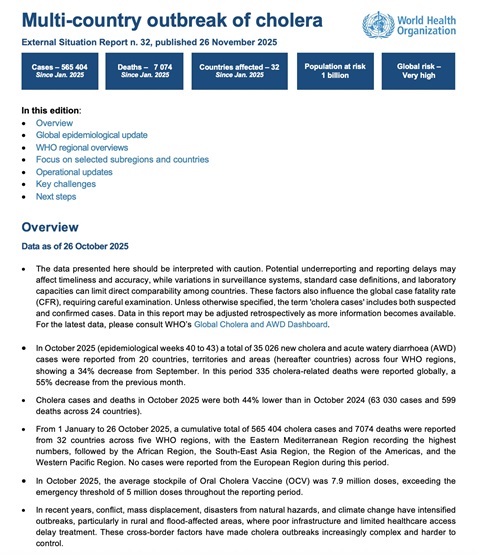The striking Swedish workers taking on carmaker Tesla – BBC

Report on the Tesla-IF Metall Industrial Dispute in Sweden and its Implications for Sustainable Development Goals
Executive Summary
A protracted industrial dispute between the Swedish trade union IF Metall and the US electric vehicle manufacturer Tesla has entered its second year. The conflict, centered on Tesla’s refusal to sign a collective bargaining agreement, presents a significant challenge to the Swedish labor market model. This report analyzes the dispute through the lens of the United Nations Sustainable Development Goals (SDGs), with a particular focus on SDG 8 (Decent Work and Economic Growth), SDG 10 (Reduced Inequalities), and SDG 16 (Peace, Justice and Strong Institutions).
Background of the Dispute
The industrial action, which commenced on October 27, 2023, involves approximately 70 car mechanics across Tesla’s ten Swedish service centers. The core issue is the union’s demand for a collective agreement, a foundational element of Swedish industrial relations.
- Parties Involved: IF Metall (representing striking workers) and TM Sweden (Tesla’s subsidiary).
- Core Demand: The implementation of a collective bargaining agreement to formally regulate pay and working conditions.
- Context: In Sweden, approximately 90% of the workforce is covered by collective agreements, making Tesla’s refusal a significant deviation from established national norms.
Analysis of Alignment with Sustainable Development Goal 8: Decent Work and Economic Growth
The dispute is fundamentally a matter of achieving decent work, as outlined in SDG 8. The union’s actions and Tesla’s response directly impact several targets within this goal.
- Target 8.8: Protect Labour Rights: The strike is a direct effort to protect the right to collective bargaining, a fundamental labor right. IF Metall’s stance aims to promote a secure working environment where conditions are not subject to arbitrary managerial decisions, as alleged by striking workers.
- Target 8.5: Full and Productive Employment and Decent Work: The union’s pursuit of a collective agreement seeks to ensure fair and predictable wages, directly contributing to the goal of decent work for all. Testimonies from mechanics regarding performance reviews and pay rises highlight the perceived lack of a transparent and equitable system, which collective agreements are designed to provide.
- Social Dialogue: The Swedish model is built on social dialogue between employers and trade unions. Tesla’s refusal to engage in this dialogue undermines a key mechanism for achieving industrial peace and sustainable economic growth built on fair labor practices.
Broader SDG Implications
The conflict extends beyond labor rights, touching upon wider sustainability and governance issues.
- SDG 10 (Reduced Inequalities): The dispute exemplifies the power imbalance between a major multinational corporation and its local workforce. By resisting a collective agreement, which is a tool for reducing wage inequality, Tesla’s position challenges the principles of this goal. The CEO’s stated opposition to unions creating a “lords and peasants sort of thing” is in direct contrast to the union’s view that collective bargaining prevents such a dynamic.
- SDG 16 (Peace, Justice and Strong Institutions): The Swedish system of collective bargaining is a long-standing and effective institution for ensuring labor market stability and justice. Tesla’s defiance challenges the integrity of this national institution, which has historically ensured peaceful industrial relations.
- SDG 17 (Partnerships for the Goals): The solidarity actions from other unions, including dockworkers in Denmark, Norway, and Finland, represent a cross-border partnership to uphold the principles of SDG 8. This coalition demonstrates a collective effort to maintain established standards for decent work.
- SDG 9 & 11 (Innovation and Sustainable Communities): A paradox emerges where a company contributing to sustainable transport infrastructure (SDG 9, SDG 11) through electric vehicles and charging stations is in conflict with social sustainability goals. The idle, unconnected charging stations serve as a physical symbol of this tension between environmental innovation and social responsibility.
Stakeholder Positions
- IF Metall: The union maintains that a collective agreement is non-negotiable for ensuring fair conditions and upholding the Swedish labor model, a position fully aligned with the objectives of SDG 8.
- Tesla Inc.: The company asserts that it can provide favorable conditions without a collective agreement, preferring direct relations with employees. This stance conflicts with the established norms of social dialogue and challenges the institutional framework for labor rights in Sweden. The hiring of replacement workers is a further departure from standard practice.
- Confederation of Swedish Enterprise: The business organization has expressed its preference for the collective agreement model, positioning Tesla as an outlier within the Swedish corporate landscape.
Conclusion and Outlook
The standoff between IF Metall and Tesla shows no sign of imminent resolution. For the union, conceding would risk eroding a cornerstone of the national labor model and undermining progress toward SDG 8. For Tesla, conceding in Sweden could set a precedent for unionization efforts in its larger operations globally. The conflict serves as a critical case study on the friction between global corporate culture and national institutional frameworks designed to promote decent work and reduce inequality, highlighting that true corporate sustainability must integrate social responsibility alongside environmental and economic objectives.
1. Which SDGs are addressed or connected to the issues highlighted in the article?
The article highlights issues directly connected to several Sustainable Development Goals (SDGs), primarily focusing on labor rights, economic justice, and the role of institutions in mediating industrial relations.
-
SDG 8: Decent Work and Economic Growth
This is the most prominent SDG in the article. The entire narrative revolves around a labor dispute concerning the core principles of decent work. The strike by Tesla mechanics in Sweden is a direct action to secure better working conditions, fair pay, and the right to collective bargaining, which are fundamental aspects of this goal.
-
SDG 10: Reduced Inequalities
The conflict addresses inequalities in power and income between a large multinational corporation and its employees. The union’s effort to establish a collective agreement is a mechanism to ensure fairer wage policies and reduce arbitrary decisions by management, as described by the mechanic Janis Kuzma. Elon Musk’s comment about avoiding a “lords and peasants sort of thing” ironically touches upon the theme of inequality that the unions are trying to address through structured agreements.
-
SDG 16: Peace, Justice and Strong Institutions
The article emphasizes the clash between Tesla’s corporate culture and Sweden’s established industrial relations model. This model, built on “strong institutions” like trade unions (IF Metall) and employer confederations, has ensured industrial peace for nearly a century. The strike is a defense of these institutions and the principles of justice and accountability they represent in the labor market.
2. What specific targets under those SDGs can be identified based on the article’s content?
Based on the issues discussed, several specific SDG targets can be identified:
-
SDG 8: Decent Work and Economic Growth
-
Target 8.8: Protect labour rights and promote safe and secure working environments for all workers.
The central issue of the strike is the protection of labor rights, specifically “the right of trade unions to negotiate pay and conditions on behalf of their members.” The article states this goes “to the heart of Swedish industrial culture.” The mechanics’ strike is an action to protect this fundamental right against a company that refuses to sign a collective agreement, thereby promoting a more secure working environment over one dependent on “the whim of managers.”
-
Target 8.5: Achieve full and productive employment and decent work for all… and equal pay for work of equal value.
The article implies a lack of fair and equal pay practices at Tesla. Mechanic Janis Kuzma’s account of being denied a pay rise for “not reaching Tesla’s goals” and a colleague being denied for having the “wrong attitude” illustrates an arbitrary system. A collective agreement, which the union is fighting for, is a primary tool for establishing transparent and fair wage structures, aligning with the principle of decent work and fair pay.
-
-
SDG 10: Reduced Inequalities
-
Target 10.4: Adopt policies, especially fiscal, wage and social protection policies, and progressively achieve greater equality.
Collective bargaining is a key “wage policy” that promotes equality. The Swedish model, which the union is defending, ensures that workers have a voice in determining their wages and conditions, preventing a situation where a powerful employer can unilaterally set terms. Tesla’s refusal to participate in this model is a rejection of a policy aimed at achieving greater workplace equality.
-
-
SDG 16: Peace, Justice and Strong Institutions
-
Target 16.6: Develop effective, accountable and transparent institutions at all levels.
The article portrays the trade union, IF Metall, as an “effective institution” representing workers’ interests. The conflict highlights the importance of such institutions in holding corporations accountable. The fact that “90% [of Swedish workers] are covered by a collective agreement” demonstrates the effectiveness of this institutional model, which Tesla is now challenging.
-
3. Are there any indicators mentioned or implied in the article that can be used to measure progress towards the identified targets?
The article provides both explicit and implicit indicators that can be used to measure progress.
-
Indicators for SDG 8 (Decent Work and Economic Growth)
-
Indicator related to Target 8.8 (Protecting labour rights):
The article explicitly mentions that in Sweden, “90% [of workers] are covered by a collective agreement.” This percentage is a direct indicator of the prevalence and strength of collective bargaining rights (Indicator 8.8.2). The outcome of the strike—whether a collective agreement is signed with Tesla—will be a direct measure of progress in protecting labor rights within this specific company.
-
Indicator related to Target 8.5 (Decent work):
The number of striking workers (“around 70 of its members are on strike”) serves as an indicator of a perceived lack of decent work. The resolution of their grievances regarding arbitrary pay decisions would be a qualitative indicator of progress towards fairer work conditions.
-
-
Indicators for SDG 16 (Peace, Justice and Strong Institutions)
-
Indicator related to Target 16.6 (Strong institutions):
The article provides a clear statistic: “70% of Swedish workers are members of a trade union.” This high rate of union density is a quantitative indicator of the strength and relevance of these institutions in the country. The duration of the strike (“reached its second anniversary”) can also be seen as an indicator of the resilience of the union in defending the established institutional norms.
-
4. Table of SDGs, Targets, and Indicators
| SDGs | Targets | Indicators Identified in the Article |
|---|---|---|
| SDG 8: Decent Work and Economic Growth |
8.8: Protect labour rights and promote safe and secure working environments for all workers.
8.5: Achieve decent work for all and equal pay for work of equal value. |
– Percentage of the workforce covered by collective agreements (Explicitly stated as 90% in Sweden). – The existence or absence of a collective agreement at Tesla’s Swedish operations. – Number of workers engaged in industrial action (Explicitly stated as “around 70” mechanics). – Reports of arbitrary pay and condition-setting by management (Implied through worker testimony). |
| SDG 10: Reduced Inequalities | 10.4: Adopt policies, especially wage and social protection policies, and progressively achieve greater equality. |
– The adoption of collective bargaining as a wage-setting policy within the company. – The challenge to the national model of collective agreements, which functions as a policy for wage equality. |
| SDG 16: Peace, Justice and Strong Institutions | 16.6: Develop effective, accountable and transparent institutions at all levels. |
– Trade union density (Explicitly stated as “70% of Swedish workers are members of a trade union”). – The ability of unions to engage companies in negotiation and uphold established industrial relations norms. – Duration of the strike (“second anniversary”), indicating the resilience of the union as an institution. |
Source: bbc.com
What is Your Reaction?
 Like
0
Like
0
 Dislike
0
Dislike
0
 Love
0
Love
0
 Funny
0
Funny
0
 Angry
0
Angry
0
 Sad
0
Sad
0
 Wow
0
Wow
0

















































































